by M. C. Jennings | Oct 20, 2022 | Academics, Accounting, Alumni Spotlight, COBA Faculty, COBA Staff, Current Students, Digital Entertainment Technology, Financial Management, Human Resource Management, Management, Management Information Systems, Marketing, Placement stories, Professional Development, School of Information Technology and Computing, Uncategorized
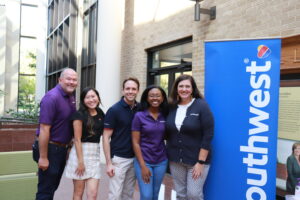
COBA Alums who work at Southwest Airlines recently came to discuss internship opportunities at the company with COBA students. Pictured from left to right are Chris Grubbs (’95), Kristy Ng (’20), Baron Smith (’09), Bethani Culpepper (’19), and Katie Coldwell (’00).
Written by special contributor Lance Fleming
When the College of Business Administration (COBA) unveiled the most significant changes to its curricula in decades, one area of great emphasis was professional development. Those studying the updates and later making the recommendations believed a professional internship would help make COBA students more well-rounded prospective employees when they left ACU.
As Dr. Brad Crisp, the Dean of the College of Business Administration said recently, “… we are placing greater emphasis on professional development by requiring a professional internship in management, marketing, and information systems and offering an internship as an option for accounting and finance majors.”
As the person serving as the director of professional development and internships for COBA, Jasmine McCabe-Gossett said the new emphasis on internships will help make students better equipped to handle real-world practices that they will face when they begin working full-time.
“Students need to take advantage of the unique timing internships can offer,” said McCabe-Gossett, who is in her first year as the Professional Development and Internship Director for COBA. “Students have the distinct opportunity to apply what can feel like abstract theories and case studies to the real world. Internships are insulated and allow students to practice in an environment designed for them to ask questions and fail, whereas, post-graduate opportunities can be far less forgiving.”
first year as the Professional Development and Internship Director for COBA. “Students have the distinct opportunity to apply what can feel like abstract theories and case studies to the real world. Internships are insulated and allow students to practice in an environment designed for them to ask questions and fail, whereas, post-graduate opportunities can be far less forgiving.”
Tim Johnston, the Assistant Dean for COBA, said a student who participates in an internship program in college will have a distinct advantage over students who don’t take advantage of those programs.
“Many years ago, with the contraction of the economy, many students were entering college without a lot of summer work experience,” Johnston said. “One of the top qualities all employers like to access is work ethic. Without a lot of work experience, it was difficult to feel confident about a student’s ability to dig-in and work hard. Many large organizations started internship programs.
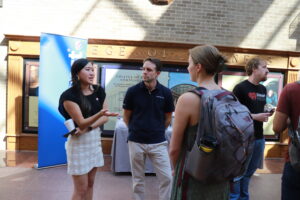
“These programs typically run for 12 weeks during the summer,” he said. “Most are paid and it’s a way for a company to have a long and intense look at the candidates. Many companies only offer full-time opportunities to those students who have completed an internship with their organization. So for many large firms, this is the path into their company.”
When a student is looking for an internship, COBA Associate Dean Andy Little said one thing stands above all when he advises a student on a potential position.
“Fit,” he said succinctly. “In other words, does this organization fit your values and the goals you have set for yourself? Will you get practical experience? What kind of people work there? Is it an industry or market segment that you would like to start your career in?”
McCabe-Gossett agrees that finding an internship in a potential career field is an essential part of finding the right landing spot.
“I encourage students to focus on finding an internship in the industry they imagine as their future career,” she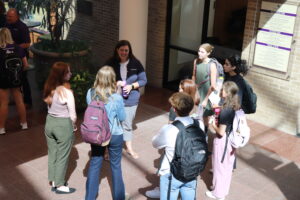 said. “Doing so will allow them to fully immerse themselves so they can determine whether or not their dream industry aligns with their values, work style, etc.”
said. “Doing so will allow them to fully immerse themselves so they can determine whether or not their dream industry aligns with their values, work style, etc.”
The National Association of Colleges and Employers has surveyed employers and determined the following qualities are most important to the potential employers surveyed. In order of importance, those qualities are:
- Problem-solving (critical thinking)
- Teamwork / collaboration
- Professionalism / work ethic
- Verbal and written communication skills
- Digital technology capabilities
- Leadership
- Global / multicultural fluency
“We want our students to demonstrate these competencies and reflect on their current areas of strength and areas where growth is needed,” Johnston said. “Their internship manager completes a formal evaluation that provides feedback on these key qualities.
“Another key advantage we are looking to provide for ACU students is an opportunity to intern with ACU alumni,” he said. “Our alumni teach students how professional excellence provides another avenue to honor God, as we serve in the marketplace.”
If you’d like to know more about internships with COBA, as either an employer or a student, email coba@acu.edu.
by M. C. Jennings | Aug 31, 2022 | Academics, Current Students, Digital Entertainment Technology, Faith Infusion, School of Information Technology and Computing, Student Spotlights, Uncategorized
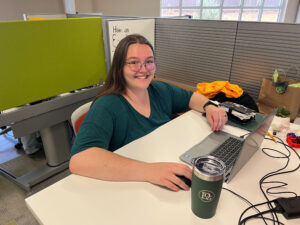 Written by special contributor Lance Fleming
Written by special contributor Lance Fleming
In most places of business, an apprentice is given a few days or even a week to get their feet wet and learn the ins and outs of the office before being fully indoctrinated into the ins and outs of the everyday job.
Alissa Davis didn’t have that luxury.
When Davis – who is pursuing her Bachelor of Science in Digital Entertainment Technology (DET) with an emphasis on Video Game Design and is on target to graduate in May 2023 – started her apprenticeship with Funeral Director’s Life Insurance Company on June 1, she had no choice but to get right to work and help her co-workers make it through one of the saddest moments in the recent history of the country.
Just one week before she began, 19 students and two teachers at Robb Elementary School in Uvalde lost their lives to a mass shooter. When Davis began her apprenticeship, she was immediately charged with helping to set up and monitor live streams of approximately 15 of the funerals that stretched over several days.
It was a tough and emotional task and one that Davis hasn’t fully put into perspective.
“I still haven’t fully processed the emotions that came with it,” said Davis, who is a senior from Stephenville. “There were several times during the services when I had to completely turn the sound off and momentarily step away from my desk where I was monitoring the live stream because I couldn’t handle the sound of the parents grieving for their lost children. There was always a tense aura in the department because we needed to do better than our best and ensure that everything went as smoothly as possible for those families and the community, who suffered great losses.”
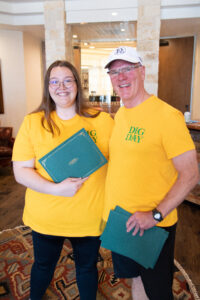 Around July 1 when her boss returned from Uvalde, Davis was assigned a new responsibility to create short training videos for both new and regular clients to watch and learn how to use the FDLIC streaming product. Despite the difficult and emotional circumstances, Davis had quickly made a name for herself at the company. So much so that at the end of her apprenticeship, Davis was awarded the Performance Plus Award, which is awarded by the FDLIC’s Board of Directors and had never before been presented to an apprentice.
Around July 1 when her boss returned from Uvalde, Davis was assigned a new responsibility to create short training videos for both new and regular clients to watch and learn how to use the FDLIC streaming product. Despite the difficult and emotional circumstances, Davis had quickly made a name for herself at the company. So much so that at the end of her apprenticeship, Davis was awarded the Performance Plus Award, which is awarded by the FDLIC’s Board of Directors and had never before been presented to an apprentice.
The award is given to an employee who shows outstanding qualities that fit several of the 22 non-negotiable traits of the company. Normally, the person who receives the award is recognized by another respected employee of the company and awarded at a company-wide meeting at the end of the month. However, Davis’s above-and-beyond effort resulted in her receiving this remarkable reward.
“I was stunned,” Davis said of the moment when she was announced as the winner of the award. “I knew that I helped the team, but I discredited myself as able to receive praise because I never went there personally or interacted with the people in person as the rest of the team did. So, when it came time to recognize the winners, I was completely stunned to see my name there.”
By the end of her second week, Davis said, she was fully trained and up to speed on almost everything a normal employee in the FDLIC Encore Department would know. The Encore Department is the technology used to live-stream funeral services.
“I had to quickly learn how to do so much more than an ordinary apprentice should in less than one week,” Davis said. “By my third day, I took on responsibilities as if I was another full-time employee because I wanted to do anything I could to help make the lives of my bosses and co-workers easier. They needed to put their focus and full attention on the devastating matter at hand and give the funeral directors on site their undivided attention and assistance.”
Davis – who said the greatest lesson she learned during her apprenticeship is that it’s OK to make mistakes –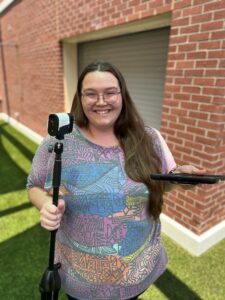 was on the job for two months and will have a full-time job waiting for her when she graduates. In the meantime, she was offered a part-time job when the apprenticeship was over and she’s currently working in that job until she can begin her full-time job. And after some time there, her goal is to pursue a career with her DET degree because her true passion is video game design.
was on the job for two months and will have a full-time job waiting for her when she graduates. In the meantime, she was offered a part-time job when the apprenticeship was over and she’s currently working in that job until she can begin her full-time job. And after some time there, her goal is to pursue a career with her DET degree because her true passion is video game design.
She credited ACU and COBA with getting the apprenticeship and learning to use her imagination to be as creative as possible.
“ACU had the connections for me; I would not have learned about this internship in the first place without them,” Davis said. “Being at ACU has helped me come out of my shell, so I can take the leaps of faith and go for something I want. My time at ACU has also taught me to think quickly on my feet so that I can learn how to do what I need to do quickly to be able to give back to and help others.
“The best thing about being a COBA student is having the opportunity for freedom to create whatever I can imagine,” she continued. “And if I can’t do it because I lack the skill, I have friends and professors around me who can and are actively willing to help because want to see me succeed.”

 first year as the Professional Development and Internship Director for COBA. “Students have the distinct opportunity to apply what can feel like abstract theories and case studies to the real world. Internships are insulated and allow students to practice in an environment designed for them to ask questions and fail, whereas, post-graduate opportunities can be far less forgiving.”
first year as the Professional Development and Internship Director for COBA. “Students have the distinct opportunity to apply what can feel like abstract theories and case studies to the real world. Internships are insulated and allow students to practice in an environment designed for them to ask questions and fail, whereas, post-graduate opportunities can be far less forgiving.”
 said. “Doing so will allow them to fully immerse themselves so they can determine whether or not their dream industry aligns with their values, work style, etc.”
said. “Doing so will allow them to fully immerse themselves so they can determine whether or not their dream industry aligns with their values, work style, etc.” Written by special contributor Lance Fleming
Written by special contributor Lance Fleming Around July 1 when her boss returned from Uvalde, Davis was assigned a new responsibility to create short training videos for both new and regular clients to watch and learn how to use the FDLIC streaming product. Despite the difficult and emotional circumstances, Davis had quickly made a name for herself at the company. So much so that at the end of her apprenticeship, Davis was awarded the Performance Plus Award, which is awarded by the FDLIC’s Board of Directors and had never before been presented to an apprentice.
Around July 1 when her boss returned from Uvalde, Davis was assigned a new responsibility to create short training videos for both new and regular clients to watch and learn how to use the FDLIC streaming product. Despite the difficult and emotional circumstances, Davis had quickly made a name for herself at the company. So much so that at the end of her apprenticeship, Davis was awarded the Performance Plus Award, which is awarded by the FDLIC’s Board of Directors and had never before been presented to an apprentice. was on the job for two months and will have a full-time job waiting for her when she graduates. In the meantime, she was offered a part-time job when the apprenticeship was over and she’s currently working in that job until she can begin her full-time job. And after some time there, her goal is to pursue a career with her DET degree because her true passion is video game design.
was on the job for two months and will have a full-time job waiting for her when she graduates. In the meantime, she was offered a part-time job when the apprenticeship was over and she’s currently working in that job until she can begin her full-time job. And after some time there, her goal is to pursue a career with her DET degree because her true passion is video game design.